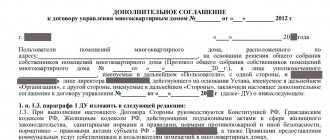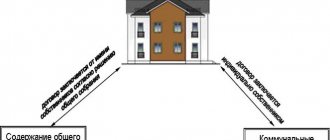Who enters information on personal accounts of utility consumers into the GIS Housing and Communal Services?
According to clause 1, part 2, art. 161 of the Housing Code of the Russian Federation, owners have the right to choose at a general meeting such a method as direct management of the house, provided that the number of apartments in it does not exceed thirty. In this case, the owners of the premises themselves enter into contracts with contracting companies for the maintenance and repair of the common property of the apartment building and the provision of utilities.
Since there is no management organization or HOA/cooperative between the owners and executors, residents often have questions about the nuances of complying with legal requirements for the proper management of apartment buildings. For example, who should enter mandatory information on the personal accounts of utility consumers into the Housing and Communal Services GIS and whether this needs to be done at all.
In accordance with section. 8 of Order No. 74/114/pr, among the information to be placed by suppliers of utility resources for the provision of utility services in apartment buildings, there is data on personal accounts and their numbers. Since, in the direct management of a house, the executor of the control system is the resource supplying organization, it is the organization that must post data on the personal accounts of consumers.
If the owners of the premises do not see such information in the GIS housing and communal services, they need to contact the supplier of the relevant utility resources with a complaint. In the absence of a response, contact the State Housing Authority, which will conduct an inspection of the RSO and, if there are violations, demand that the organization eliminate them.
How the calculation of the fee for one-time use in houses without a management company and a homeowners association has changed since July 1
New procedure for managing apartment buildings (Part 3)
Interaction between the manager, landlord, tenants and tenants. Obligatory relations with tenants of residential premises under social and “commercial” rental agreements in an apartment building and tenants of residential and non-residential premises are primarily the owners of the relevant premises.
In conditions of independent choice by the owners of premises in apartment buildings of management organizations, tenants of residential premises owned by the city must enter into social tenancy or rental agreements with the landlord, which may be either a compulsory medical insurance (government body) or a person authorized by the owner. It seems that due to the ongoing nature of the relationship arising from social tenancy and rental agreements, assigning the functions of a lessor to a management organization managing an apartment building is not advisable. This is explained by the fact that the manager is chosen by the general meeting of owners of the premises in the building, and not by the municipality alone. There are no guarantees that the owners will choose exactly the management organization that is the landlord. There is no point in entrusting the function of a landlord to a new management organization each time in each specific building. Moreover, over time the number of management organizations will increase. Is it advisable to have several different residential landlords in a settlement belonging to the same municipality?
Owners have the right to authorize other persons (in particular, the management organization) to enter into lease agreements on their behalf or on their own behalf. If the owner of residential premises - the municipality - nevertheless entrusts the management organization with performing the functions of a landlord, then this instruction must be contained in a separate agreement, and not in the management agreement. Indeed, in accordance with the Housing Code of the Russian Federation, a management agreement is concluded with all owners on the same terms. Then the municipality is obliged to separately pay directly from the budget for the services of the manager to perform the functions of the landlord. Distributing the costs of performing these functions among all owners is unacceptable.
In connection with changes in federal housing legislation: conditions for the provision of residential premises under social tenancy agreements and rental agreements in the state and municipal housing stock, the rights and obligations of the landlord and tenant, the procedure for paying for housing and utilities - adjustments to social and “commercial” tenancy agreements are necessary residential premises owned by municipal or state property. At the same time, with regard to rental agreements in private housing, the norms of Chapter 35 of the Civil Code of the Russian Federation practically remained the same.
Under social and “commercial” rental agreements, the landlord is responsible to the tenant for the provision of housing and utility services. The Housing Code of the Russian Federation does not allow tenants to conclude any contracts for the provision of housing, utilities and other services with the management organization chosen by the owners of premises in an apartment building.
Management of apartment buildings under state and municipal ownership
According to the Housing Code of the Russian Federation (Article 163), the management of apartment buildings, all premises in which are owned by the Russian Federation, constituent entities of the Federation or municipalities, is carried out in the manner established respectively by the Government of the Russian Federation, state authorities of the constituent entities of the Federation or compulsory medical insurance. There are currently few such houses, but perhaps after the completion of free privatization of housing from January 1, 2008, their number will increase.
The law contains an important provision: the management of apartment buildings must be carried out through the conclusion of management agreements by the relevant authorities with management organizations selected based on the results of open competitions. In this case, the terms of the management agreement must comply with the provisions of Art. 162 Housing Code of the Russian Federation. The legislator's requirement to select a manager through an open competition is aimed at ensuring equal conditions for the activities of organizations of both municipal (state) and private forms of ownership. Such houses can also be managed by individual entrepreneurs.
Conditions and procedure for selecting a compulsory medical insurance management organization
The municipality is entrusted with another important function for the period until the owners of premises in individual apartment buildings move to independent choice and implementation of the management method. If during the year the method of managing the house is not chosen or the decision made is not implemented, then the compulsory health insurance company is obliged, in the manner established by the Government of the Russian Federation, to hold an open competition to select a management organization.
The fact that there was no choice of how to manage the house during the year is quite easy to establish. The meeting of owners of an apartment building must be legitimate, and as a result of its work a decision must be made, which is recorded in the minutes, the storage procedure of which is established by Art. 46 Housing Code of the Russian Federation. The fact that the chosen method of managing a house has not been implemented can be established by formal criteria.
So, if the decision of the owners of premises in an apartment building includes a method of direct management, then the owners must enter into agreements with the relevant organizations for the provision of services for the maintenance of the house (removal of household waste, cleaning of the local area and common areas in the house, etc.), performance of work for home repairs (if necessary) and provision of utilities. These agreements can be concluded directly by each owner or their authorized person.
If the decision of the owners of premises in an apartment building includes a method for managing a HOA or consumer cooperative, then actions must be taken to create such an organization.
If the owners of the premises chose at the general meeting the method of managing the management organization, then it must be chosen and a management agreement must be concluded with it.
The municipality is obliged to appoint a management organization if the owners do not take real steps to implement the decision.
An open competition for the selection of a management organization must be held by the compulsory medical insurance in the manner established by the Government of the Russian Federation (Part 4 of Article 162 of the Housing Code of the Russian Federation). Obviously, in this order, not only the procedures for announcing a competition will be established, but also the rules for evaluating the proposals of applicants and developing the essential terms of the management agreement. Within ten days from the date of summing up the results of the open competition, the local government must notify all owners of premises in an apartment building about the results of the competition and the terms of the management agreement developed thereon.
The owners of premises in an apartment building are obliged (part 5 of Article 162 of the Housing Code of the Russian Federation) to conclude a management agreement with the management organization selected based on the results of the competition in the manner prescribed by Art. 445 of the Civil Code of the Russian Federation.
Within 30 days from the date of receipt of the draft agreement, owners of premises have the right to:
- sign an agreement;
- refuse to sign the contract;
- offer to sign the agreement on different terms (protocol of disagreements).
The parties may agree on terms other than those specified in the Civil Code of the Russian Federation.
The manager who has received from the owners of the premises (the owner of the premises) an offer to sign an agreement on different terms, within 30 days from the date of its receipt, has the right to:
- sign an agreement;
- refer disagreements to the court. If, after the expiration of the 30-day period, a protocol of disagreements on the essential terms of the agreement is not filed with the court, the agreement is considered not concluded. The right to go to court with disagreements is primarily the party for whom the conclusion of an agreement is a right and not an obligation, i.e. the manager. With the knowledge of the manager, the owners of the premises can also go to court. At the same time, he can submit his proposals on the content of the terms of the management agreement.
If the parties sign an agreement, the terms contained in it are considered agreed upon. In the event that the manager has referred the disagreement to the court, the court may oblige the owners of the premises to enter into a management agreement on different terms. If the owners of the premises evade concluding a management agreement, the manager has the right to apply to the court with a demand to force them to conclude an agreement. A party that unreasonably avoids concluding a contract must compensate the other party for the losses caused. Under losses in accordance with Art. 15 of the Civil Code of the Russian Federation, it is necessary to understand “the expenses that a person whose right has been violated has made or will have to make to restore the violated right, loss or damage to his property (real damage), as well as lost income that this person would have received under normal conditions of civil circulation , if his right had not been violated (lost profits).”
It is very important that the terms of the management agreement are the same for all owners of premises in an apartment building. Therefore, if any of the owners and the management organization agree on conditions different from those on which some part of the agreements with other owners in the same house were previously signed, or the court decides to conclude a management agreement on other conditions, then In all these cases, it is necessary to make changes to previously concluded management agreements.
The validity period of the management agreement concluded by the owners of the premises is mandatory in the case when the management organization is chosen instead by compulsory medical insurance in accordance with Part 5 of Art. 162 of the Housing Code of the Russian Federation, cannot exceed one year (parts 4 and 6 of Art. 162). No later than a year after the conclusion of the management agreement, the compulsory health insurance company is obliged to convene a meeting of the owners of the premises to choose a method for managing the apartment building. If the owners again do not make a decision on the management method or do not implement what has already been made, then the municipality is obliged to comply with the requirements of paragraphs. 4-8 tbsp. 161 of the RF Housing Code once again (holding a competition to select a manager and the terms of the management agreement, communicating the results of the competition to the owners, concluding management agreements, etc.). The next meeting of owners is not intended to “confirm” the powers of the management organization (which are terminated), but to re-choose the management method.
If the municipality fails to fulfill this obligation, any owner of premises in an apartment building has the right to go to court with a demand to oblige the compulsory health insurance to select a management organization based on the provisions of Part 4 of Art. 161 Housing Code of the Russian Federation.
The conclusion of an agreement for the management of an apartment building without holding an open competition is permitted if such a competition is declared invalid in accordance with the legislation of the Russian Federation. In this case, the choice of a management organization must be carried out in accordance with the procedure established by a resolution of the Government of the Russian Federation.
Local authorities of the city have the right to decide on the choice of a management organization only in strictly limited cases by law and provided that the owners of premises in a particular apartment building have not made a decision to choose one of the management methods provided for by the Code or have not begun to implement the decision made.
Subjects and procedures for monitoring the condition of apartment buildings and the quality of housing and communal services
One of the components of the management function is control. It is necessary to distinguish:
- control of the condition of an apartment building, which is carried out by government authorities (for example, the state housing inspection);
- control of owners (homeowners' association, housing cooperative) over the quality of fulfillment of obligations by the management organization (when choosing the appropriate management method) or contractors (with direct management or management of the homeowners' association or housing cooperative);
- control of HOA and housing cooperative members over the management bodies of these non-profit organizations;
- control by compulsory health insurance over the management organization’s fulfillment of the conditions proposed in an open competition.
In accordance with the Civil Code of the Russian Federation (Article 210), all owners of the premises are responsible for the condition of each apartment building. Therefore, the state housing inspection, bodies exercising control over fire safety (under the Ministry of Emergency Situations of Russia), energy supervision units (under the Federal Energy Agency), inspections of the Gosgortekhnadzor of Russia (under the Federal Service for Environmental, Technological and Nuclear Supervision) and other authorized bodies for any types of violations has the right to ask not only the managers who committed violations of the established requirements, but first of all the owners who hired these performers. The procedure for such control and responsibility should be established at the federal level.
In addition to state control, local control must also be exercised. Firstly, the municipality is often one of the owners of residential premises, and the most organized one, which alone owns a fairly large share of residential premises in the settlement. Control must ensure that the municipality fulfills its obligations as an owner and renter. In addition, he is obliged to express and defend, within his competence, the interests of other owners of premises. At the same time, it is advisable for municipalities to organize constant interaction with associations (unions) of consumers.
Authorized state and municipal bodies (organizations) must have the opportunity, within their competence, to check the quality of management of apartment buildings, the frequency, actual volume and quality of work on the repair and maintenance of apartment buildings and local areas, the supply of electrical and thermal energy, water and gas, completeness eliminate deficiencies specified in reports of previous inspections, as well as check the timeliness and quality of elimination of accidents, damages, and deficiencies indicated in consumer requests. In case of violations of the timing and quality of supply of resources, provision of services and performance of work, authorized bodies must force organizations that have corresponding obligations to citizens to recalculate previously accrued payments.
Results of monitoring the condition of apartment buildings and the quality of utility services:
- are the basis for bringing the culprits (owners of premises in apartment buildings, homeowners associations, housing cooperatives, managers and other organizations) to administrative responsibility;
- used to recalculate payments of owners and tenants of premises in apartment buildings;
- are taken into account when assessing the quality of work of managers of housing, contracting and utility organizations (regardless of their organizational and legal form) as information when assessing applicants participating in competitions held by compulsory medical insurance;
- are used to apply economic sanctions to violators in the amount and manner established by civil legislation, consumer protection legislation and contracts, up to the termination of contracts and replacement of performers who do not provide adequate quality.
The owners of the premises can themselves control the management organization (if choosing this method of management) or contractors (if direct management) or entrust this to the appropriate specialist or organization. The latter is possible if the owners of the premises decide to conclude, separately from the management agreement, a paid agreement for the provision of services to monitor the activities of the manager. At the same time, in the management agreement, the owners can stipulate the procedure for allowing the manager to control documents and ongoing processes of a controller authorized by the owners.
The quality of the activities of repair and maintenance, resource supply and specialized organizations is assessed both by management organizations (within the framework of mutual contractual obligations) and by authorized state and municipal control bodies (within the framework of ensuring a healthy and safe living environment for citizens).
Control should allow timely and complete identification of violations by managers, contractors and utility organizations of obligations to owners and tenants of residential premises in apartment buildings, ensure improvement of the quality of their work, and stimulate the participation of citizens in housing management by timely reducing the amount of payments if violations are detected. The responsibility of performers and the quality of service to the population are increasing, as well as the activity of the owners of premises in apartment buildings.
Creation of conditions by local self-government bodies for the management of apartment buildings
The Housing Code of the Russian Federation (Article 165) provides for a number of measures that should facilitate the exercise of the rights of premises owners to independently choose the method of managing an apartment building.
CHIs are obliged to provide equal conditions for the activities of management organizations, regardless of their organizational and legal forms. This concerns the “admission” of private organizations to the sphere of management and transfer on equal terms of production and warehouse premises to management organizations.
Municipalities have the right to provide management organizations, homeowners' associations and housing cooperatives with budget funds for major repairs of apartment buildings. This can be either a gratuitous transfer of funds or the provision, for example, of budget loans or other methods of financing. Naturally, financing by the municipality - the owner of its part of the capital repairs of apartment buildings - is carried out in the amount that is established for all owners of premises in the building. Low-income people should receive support funds to pay for major home repairs as part of subsidies for housing and utilities.
Compulsory self-government bodies are obliged to help improve the qualifications of persons managing apartment buildings and organize training for persons who intend to carry out such activities. First of all, this concerns the development of the institution of private managers - individual entrepreneurs.
At the request of citizens, local self-government bodies and management organizations are required to provide information on established prices for work and services for the maintenance and repair of apartment buildings, their volume, list and quality of performance. This will help the population in assessing the various management organizations operating in the settlement and choosing a method for managing an apartment building.
conclusions
In accordance with the requirements of the new housing legislation, the work on concluding contracts in the field of management of apartment buildings, the provision of housing and utility services requires a serious restructuring resulting from a change in the principles of forming obligations:
- premises owners should be given a real opportunity to independently choose how to manage an apartment building;
- cases of decision-making by the municipality on the management of residential buildings are limited by law;
- there should be real opportunities to eliminate the monopoly of municipal (state) enterprises and institutions and admit organizations of any form to the housing management market, change managers at the discretion of the owners of the premises, early termination or change the terms of management contracts;
- it is advisable to terminate the right of economic management of the State Unitary Enterprise (MUP) or operational management of the State Unitary Enterprise (MU) for residential premises in apartment buildings, and the right of economic management and operational management entirely for the entire apartment building, in which the premises are owned by several persons, is illegal;
- The practice of compulsory medical insurance and the subjects of the Federation becomes illegal:
- choose a manager for an entire settlement, a district in a city or a group of houses;
- adopt regulations regulating civil relations between managers and owners of premises;
- adopt regional or local regulations establishing the procedure for paying for housing and utilities (for example, on mandatory payments through the RCC, the introduction of a single payment document, etc.);
- It is inappropriate to transfer the functions of a landlord to the municipal customer service. This function must be performed either by the municipality itself, or by a special institution (enterprise) that is not a manager;
- the municipality does not have advantages over other owners of premises in matters of choosing a management method at a general meeting;
- The local self-government body is obliged to hold meetings to select a management method one year after each case of choosing a manager through an open competition. The introduction and establishment of new legislative principles of management, parity contractual relations between owners and managers should make it possible to demonopolize the management system of apartment buildings, create the prerequisites for improving the quality of housing and communal services for consumers and reducing the cost of maintaining and repairing housing, increasing the profitability of organizations in the housing and communal services complex and ensuring the truly market nature of economic and financial relations (replacing the predominance of pseudo-market and administrative relations).
Who is responsible for the quality of utilities inside the house?
One of our readers asked who is responsible for the provision of utility services of inadequate quality and compensates for damage (if any) if quality indicators are not violated up to the balance sheet limit.
According to RF PP No. 354, with the direct management method, the executor of the control system is the resource supplying organization. Therefore, it is she who bears responsibility for the poor quality of services.
An exception may be the situation when the owners have entered into an agreement with any contractor that is involved in the maintenance and repair of their common property. If the quality of a utility service deteriorates due to the actions/inaction of such an organization, then it will be the organization that will be held responsible for the damage caused.
Prospects for self-government
The prospects for NU MKD in Russia today do not inspire optimism. There are fewer and fewer houses with 30 or fewer apartments due to demolition programs for old housing. On the contrary, multi-storey buildings are being built in all major cities. Therefore, one should not expect the development of such a method of managing MKD.
The transition to NU has both positive and negative sides. It allows residents to feel free and protected from interference by officials and management companies. But they require increased awareness and understanding that the quality of life in apartment buildings depends only on the joint actions of residents.
The correct choice of the form of management of apartment buildings will help owners avoid many problems. We have prepared for you useful publications about such forms of management as housing cooperatives and homeowners' associations, as well as about what is better than housing cooperatives, HOAs or management companies and how the amount of payment for managing apartment buildings is determined.
Can property owners refuse some of the work/services prescribed in RF PP No. 290
Let's look at the question of whether the owners of the OSS have the right to decide to refuse to clean the staircases and local area included in the contract with the contractor for the maintenance and repair of the common property of the apartment building.
In accordance with paragraphs. “a” clause 2 of RF PP No. 290, if the management of an apartment building is carried out directly by the owners of the premises, the list of services and works included in the minimum list, the frequency of their provision and implementation are determined by the general meeting of owners and are reflected in its decision. Thus, owners have the right to exclude cleaning of common areas and/or local areas from the list of services/works.
When RSO cannot charge for a coefficient that increases the standard
On a note
When directly managing a house, the owners themselves bear responsibility for the proper maintenance of the common property. If the providers of public services in such conditions are resource suppliers, then for the repair and maintenance of common property and utility networks, apartment owners must find a contractor, relations with which will be regulated by civil law.
At the general meeting, the owners themselves establish a list of works and services that are necessary in the house for its proper maintenance, and include such a list in the contract with the contractor. A company that has received a license to manage apartment buildings can also act as an organization servicing the house. But according to the contract agreement, such a management authority in relation to a house under direct management is not subject to licensing control by supervisory authorities.





